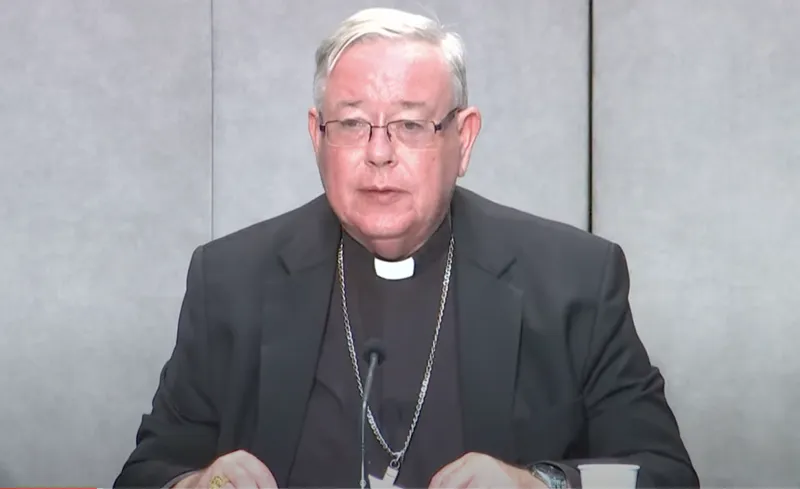
Vatican City, Oct 18, 2022 / 10:00 am (CNA).
Cardinal Jean-Claude Hollerich, the relator general of the Synod on Synodality, has said that he is convinced that the Second Vatican Council “saved the Church.”
“If we did not have that point of reform that was the Second Vatican Council, the Church today would be a small sect, unknown to most people,” Hollerich said in an interview with the Spanish news outlet Vida Nueva published on Oct. 17.
The archbishop of Luxembourg added that he believes that if Vatican II had not taken place the Church “would have been reduced to a group that performs beautiful rites, but that nobody knows anything about.”
“Today we must adapt to the changing mindsets. People are still interested in the Gospel and we must rediscover the authenticity of being true disciples of Jesus,” he said.
When asked about resistance to the Second Vatican Council, Hollerich replied that “the strongest comes from the traditionalists, who curiously are also a postmodern phenomenon.”
“They choose only one point of reference in history, without looking before and after. They forget how the growth of tradition develops. It is a bit like what happens with Netflix series: they tell you a part of the story, but invented, not real,” he said.
“That’s why it’s no coincidence that traditionalist movements attract young people from France and the United States.”
Hollerich currently serves as the president of the commission of European bishops’ conferences. Pope Francis chose the Luxembourg cardinal and Jesuit to serve as relator general of the ongoing Synod on Synodality, which was recently extended to 2024.
The cardinal said that he is very happy with the working document for the continental phase of the Synod on Synodality that is expected to be published in late October or early November “because of how it reflects the synodal Church model.”
“All of Francis’ synodality comes from the council: it is a treasure to actualize the Church,” he said.
If you value the news and views Catholic World Report provides, please consider donating to support our efforts. Your contribution will help us continue to make CWR available to all readers worldwide for free, without a subscription. Thank you for your generosity!
Click here for more information on donating to CWR. Click here to sign up for our newsletter.




You mean like it is in Belgium today?
Hollerich [Cardinal and Synod relator] has a point. Many of us may mightily disagree with some of his proposals, although whether the Church would have slowly dissolved into a fraction is feasible if the Council did not occur [would a pre Vat II Church have survived intact during the sexual revolution and the pill and its theological supporters?].
Hollerich’s error is assuming anyone who holds to traditional truths is a traditionalist. Traditionalism is an ideology of intransigence, whereas a traditional believer holds to what remains true, inclusive of development within a hermeneutic of continuity.
Gag me with a spoon.
Only Christ can save us from such fetid stew as the Synod leaders have cooked up and now suggest we eat. I’ll starve first.
Opines Cardinal Hollerich: “[the Church] would have been reduced to a group that performs beautiful rites, but that nobody knows anything about.”
And now, who WITHIN the Church “knows anything about” the Church? Now, with weekly Mass attendance below 10% and with no memory of “beautiful rites”? Says our oracle from on high: “(t)oday we must adapt to the changing mindsets,” meaning overturning our innate natural law and the Catechism on such elementary matters as human sexuality and much else.
Some empty-suit red hats ought to spend more time outside of the echo chamber. Today, a hollow Church being swallowed up by a “sect” called Secular Humanism.
Cardinal Hollerich, here, deploys Modernist disputation, same as when he deposed that “blessings” for “same-sex unions” is “not a settled matter”.
People are carrying on as if the Modernist heresy has been extinguished or has subsided. No, what we must be doing is, learning to spot its markers and manifestations as it continues; and recognizing when the hierarchy is skipping on it. For instance, my Archbishop has declared that “we have gone past Modernism and Postmodernism”; but this formulation is itself fit with Modernist styling and NOT the Church’s response to Modernism. The very word “post-modern” is part of the Modernist coding, a signifier.
The invention and inventiveness are Hollerich’s -from Hollerich, not the Church. What we are saved by, is Jesus Christ. VATICAN II is not a novel feature, but an extension and emphasis; and it is a useful practical composition, that exists among others, giving a reliable expression of the Church’s life. It doesn’t propose to be “complete” -LG 12.
At the same time then, Hollerich succeeds in misrepresenting it and contorting the evangelical insight. This part of it would just be a serious failing for a cardinal even amounting to sin, irrespective of the problem of Modernism.
Eminence Hollerich,
Because of Vatican II the Roman Catholic Church today is already an underground TLM sect.
Eminence Hollerich,
Without Post-Conciliarism, Vatican II might not today be blamed for transforming the Roman Catholic Church into a small underground Sect. But from from Underground China to the Carmel of Philadelphia, from China Deal to Traditionis Custodes, the Truth is History – n’est-ce pas ?
Eminence Hollerich,
Without Post-Conciliarism, Vatican II might not today be blamed for transforming the Roman Catholic Church into a small underground Sect.
But from Underground China to the Carmel of Philadelphia, from “China Deal” to “Traditionis Custodes”, the Truth is History – n’est-ce pas ??